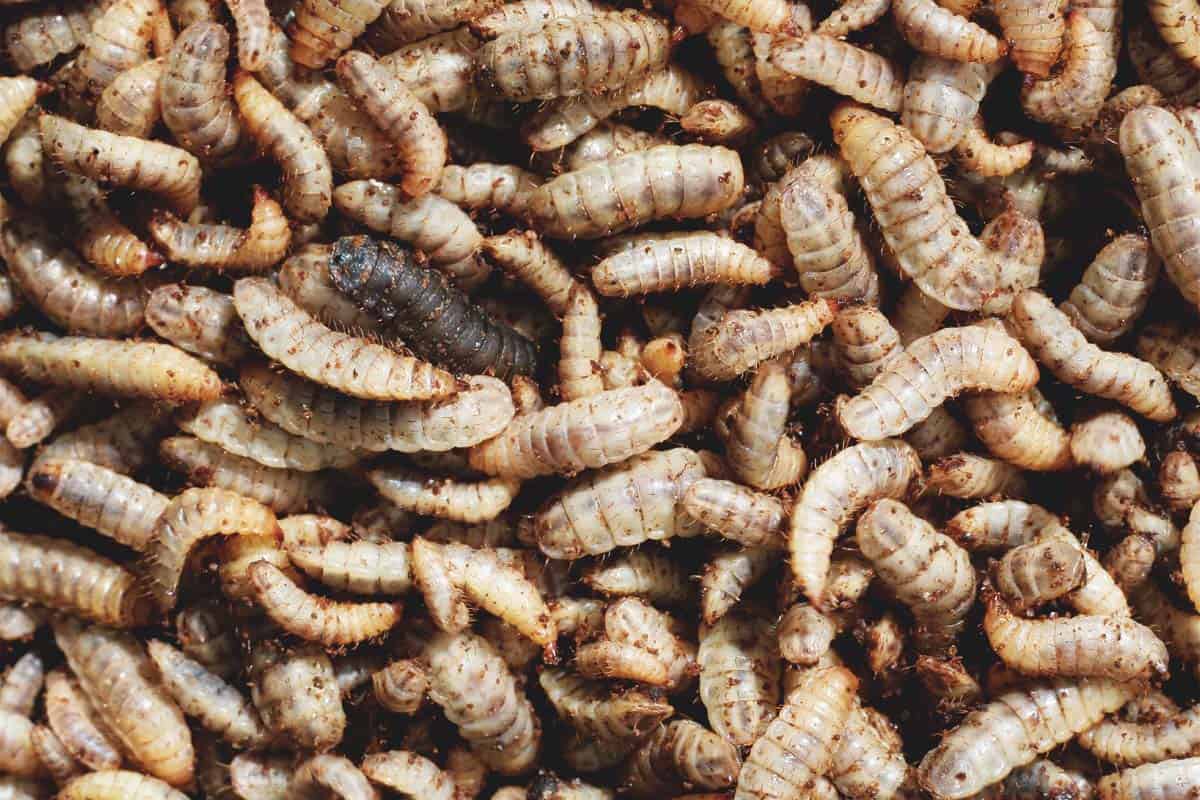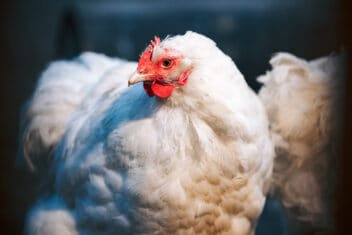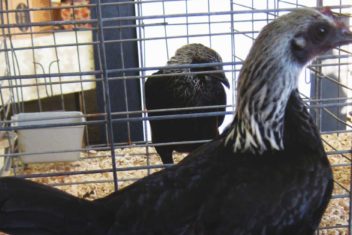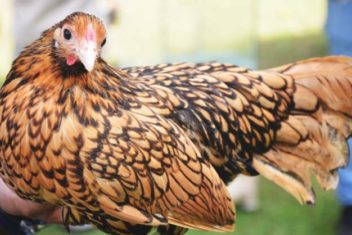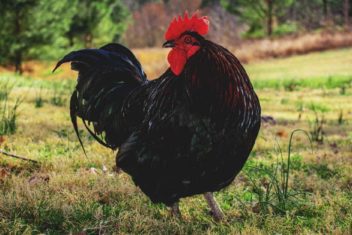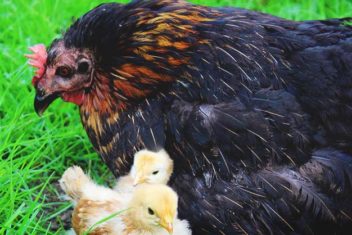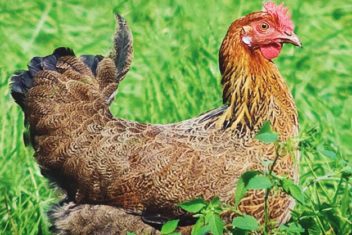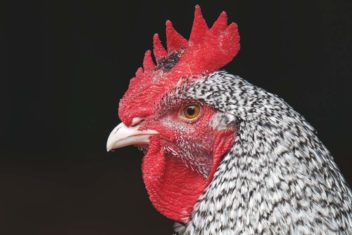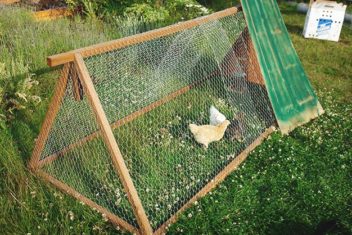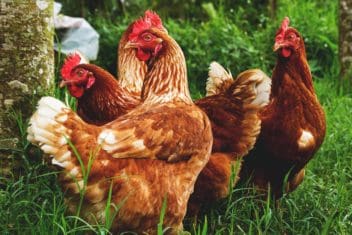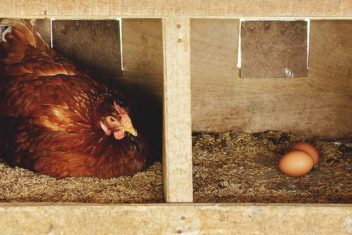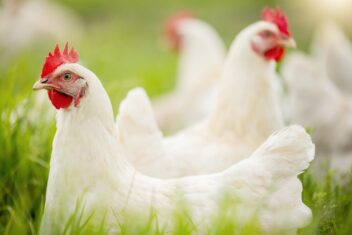Getting your chickens through a cold, snowy winter can be a difficult feat.
However, providing plenty of high-fat treats is an excellent way to keep up egg production and to make sure your backyard birds are getting all the nutrients they need. Not only that, but feeding treats like black soldier fly larvae can give your chickens something to do to prevent wintertime boredom.
No more “cooped-up” chickens giving each other grief plus healthier chickens? It sounds like a win-win situation!
Here’s everything you need to know about black soldier fly larvae. I’ll also tell you how you can grow your own on your small farm to save some time and money.
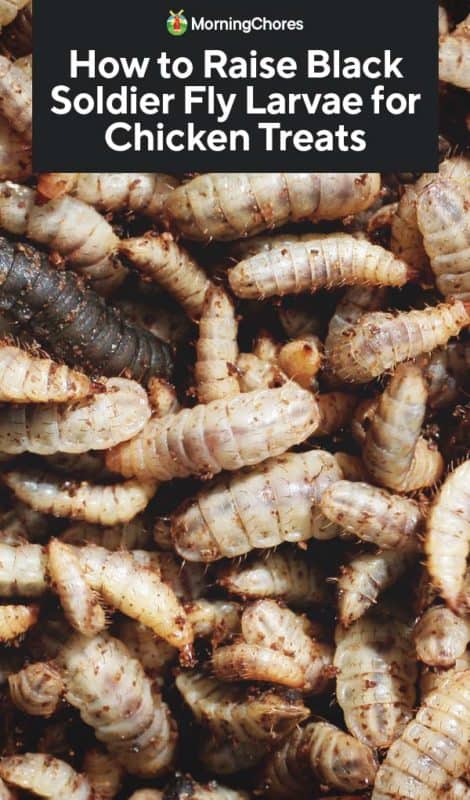
What Are Black Soldier Fly Larvae?
Black soldier fly larvae are tiny insects that pack a huge wallop of nutrition for your chickens’ diets. Filled with fat, protein, and many essential minerals and vitamins, black soldier fly larvae can help your chickens not only survive but thrive all winter long.
The black soldier fly is a member of the Stratiomyidae family, referred to scientifically as Hermetia illucens. You don’t have to have any kind of skill in order to raise black soldier fly larvae, meaning you can produce a healthy source of fat and protein for your chickens with very little expense.
In nature, black soldier fly larvae are important members of the ecosystem. They convert wastes like rotting food back to valuable resources. They don’t carry any disease and don’t have any stinging parts, either, meaning they are totally safe to produce and use on your farm.
The Lifecycle of Black Soldier Fly Larvae
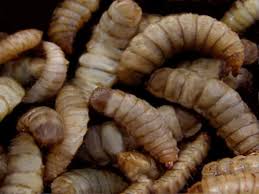
To grow your own black soldier fly larvae, it’s important that you understand the unique lifecycle of these insects.
Each black soldier fly has a short 45-day life. This can be broken down into four distinct stages.
As an adult, the black soldier fly can only live up to nine days. Often, it will not make it past five days. Despite this short lifespan, a mature black soldier fly will deposit up to 800 eggs, doing so near decaying food.
These eggs – which form the basis for the next stage, the “egg stage” – are usually found around rotten food or compost. Eggs hatch into larvae within just four days.
The larval stage is the longest stage of the black soldier fly’s life. This lasts for two weeks, during which time your larvae will eat food, excrete it, and convert waste into usable material.
In the final stage, the pupal stage, your larvae will convert from larvae to adult. Nutritional content in the pupa stage, which lasts about one week, is at its peak.
Why Do Chickens Love Them?
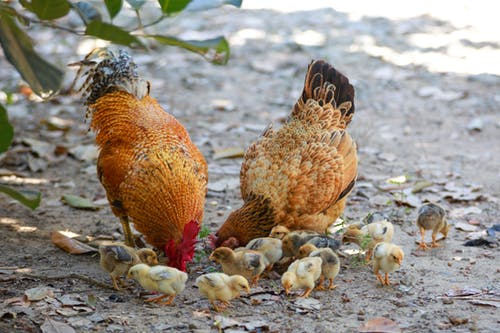
It might make your skin crawl and your stomach a bit queasy to look at them squirming around in your bins, but chickens view these larvae as the very finest of the world’s fine dining. Here are some reasons why.
1. Nutritional Content
Chickens are much better at humans in knowing instinctively which foods are good for them. Black soldier fly larvae are loaded to the brim with calcium (5%), crude fiber (7%), fat (34.8%), and crude protein (42.1%). These percentages, according to research conducted by the University of Massachusetts, make black soldier fly larvae some of the most nutritious foods around.
2. Feather Loss Prevention and Egg Production Booster
As you likely already know, your chickens will molt each year, typically in the early fall. While this is a natural part of the chicken’s lifecycle, it can be uncomfortable and unpleasant for your naked little birds. You can encourage a more rapid regrowth by feeding protein- and fat-rich foods, like black soldier fly larvae!
Protein- and calcium-rich foods like these larvae are also known to stimulate egg production, giving you double the benefits when you use them as a chicken treat.
3. A Fun Way to Fight Boredom
Chickens can be downright mean and bullies when they’re bored, going so far as to pluck and cannibalize fellow chickens to death. Fighting boredom is essential, especially if you need to keep your flock confined in a coop all winter.
Black soldier fly larvae can help.
Not only will the act of eating these tasty snacks distract your chickens, but it will also give them something to do as they may feel the desire to chase the larvae (and each other, when holding the larvae) around the chicken yard. Chicken football, at its finest!
4. Dry, Odorless, and Clean
Black soldier fly larvae are dry to the touch, not slimy. They also produce no odor, so they won’t stink up your house, barn, or chicken coop. Since they don’t spread diseases, you don’t have to worry about them getting your chickens sick, either.
How to Raise Black Soldier Fly Larvae
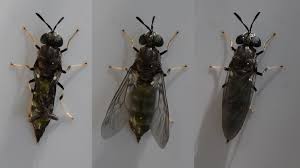
You can easily buy your own black soldier fly larvae online, but it can be much more fun (and less expensive) to raise your own.
1. Buy Some Starter Larvae & Set Up Their Home
You need to begin by purchasing black soldier fly larvae from a reputable source. You can purchase these online and have them shipped right to your door. Make sure you have their home set up long before they get there so you aren’t scrambling to complete it at the last minute.
At the very least, the home will need to consist of a place where the insects will live along with a lid to keep contaminants out. You’ll also need a method of providing food and for organic fluid to drain back out, along with a way to harvest your larvae.
The substrate needs to be no more than three inches deep. Otherwise, your larvae can suffocate. Make sure this structure is mold- and weather-resistant, and don’t place it in direct sunlight or otherwise inopportune conditions.
2. Control for Humidity & Temperature
First, make sure you have the optimal conditions. The larvae survive at temperatures as low as 35 degrees. However, they will be the most productive between 50 and 113 degrees. The ideal temperature is 95 degrees.
While the black soldier flies are mating, you will need to keep humidity between 30 and 90%. The temperature should be slightly lower, at 82 degrees. After mating, the larvae will mature the quickest at 70% humidity, but you can keep temperatures the same.
To maintain humidity, you can simply moisten the feed. This helps in another way, too. If the fee is too dry, your flies will have a hard time digging in. If it’s too wet, they can suffocate or drown.
3. Add Your Food
Next, you need to add some food. Black soldier flies will eat any kind of organic matter, like food scraps, coffee grounds, compost, or even manure. If you’ve ever raised your own compost worms, feeding your fly larvae will be almost the same. Avoid inorganic materials as well as fats and meats.
Once the food is added and your black soldier flies are nice and cozy in their new home, all you need to do now is wait!
How to Harvest Black Soldier Fly Larvae
Without a doubt, harvesting black soldier fly larvae is the easiest part of the process. All you need to do is put a bucket with holes in it inside the container in which you are raising them. Put some food scraps inside, and wait.
Eventually, the larvae will wiggle their way into the bucket to get a snack. Then, you can feed the larvae to your chickens.
If you have the facilities and know-how, you can freeze-dry your excess black soldier fly larvae for snacks later on too. While live larvae only have a shelf life of about three or four weeks, those that have been dried can be used for up to six months. After all, the lack of moisture prevents mold and bacteria growth.
Consider Growing Your Own Black Soldier Fly Larvae
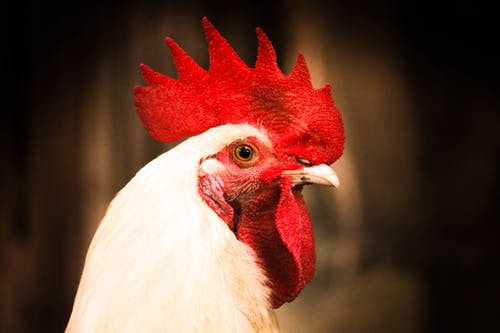
Growing black soldier fly larvae isn’t for everyone. After all, it does take a little bit of time and an isolated corner of your home or barn where you can place the larvae’s home.
However, once you get the tub established, you can more or less let the critters fend for themselves. They’ll continue to regenerate as long as you keep adding waste!
But if it’s not the right choice for you, don’t worry. You can also purchase dried black soldier fly larvae relatively inexpensive online – or consider other high-protein treats for your chickens like these.
The choice is yours to make!
